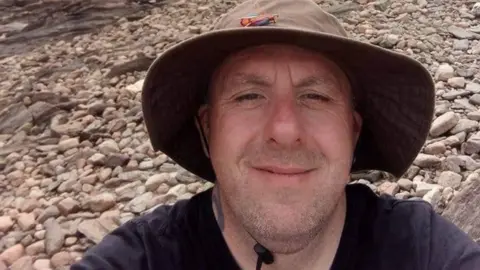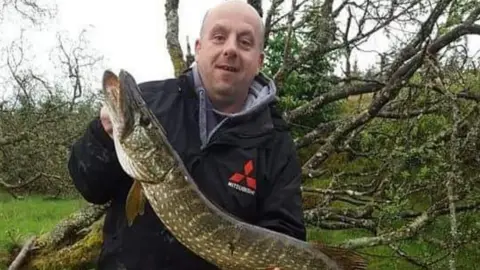'Underwater search device could spare families our grief'
 FACEBOOK
FACEBOOKThe family of a man whose body was found underwater with a sonar search device have called for the tech to be rolled out by Police Scotland.
Volunteers took two just days to locate fisherman Greig Stoddart with the 'AquaEye', weeks after he disappeared at Gartmorn Dam on Christmas Eve.
Mr Stoddart, 44, was fishing with friend Ian McBurney, 55, when the pair disappeared in the water near Alloa.
His cousin Thomas said families could be spared grief if police had the tool.
Mr McBurney's body was found on Boxing Day, but Mr Stoddart was only recovered on Sunday by Lancashire-based charity Beneath The Surface (BTS).
Police Scotland's marine unit was only able to spend a limited amount of time in the water during the search.
BTS borrowed and deployed the AquaEye to locate him and his boat in the Clackmannanshire reservoir, around 50 hours after they were given full access to the water.
The sonar device sends a soundwave through a 50-metre area of water and listens for a return echo.
 Facebook
FacebookThe technology, developed in Canada, costs around £6,000. Thomas Stoddart said this a small price to pay for families.
He told BBC Radio Scotland's Drivetime programme: "When we actually found Greig it was a massive weight off of everyone's shoulders.
"The actual time was two days and two hours and that led to the boat and the body being recovered.
"There is one AquaEye in the UK. Obviously they can't guarantee anything, but it cuts down dive time."
The family launched a fundraiser to buy BTS another AquaEye to aid searches for other missing people.
'Things must change'
Mr Stoddart said police use of the technology was lagging behind and cases could take longer to solve.
He added: "The police did advise me that they have only just started using sonar and they are still training
"The resources for the police is not where it should be in 2024. It should be a lot more advanced.
"If police had the right resources, adequate members on their team and the latest tech, I'm sure they would have results - but things have to change."
Police Scotland said it deployed a wide range of technology in missing person searches and treated each case with the "utmost seriousness".
A spokesperson said: "All searches are planned and risk assessed to ensure the best possible chances of finding a person and to safeguard our officers.
"The families of those who have gone missing are kept up to date throughout a missing persons enquiry."
The Scottish government said it would raise the issue with Police Scotland "for further discussion".
